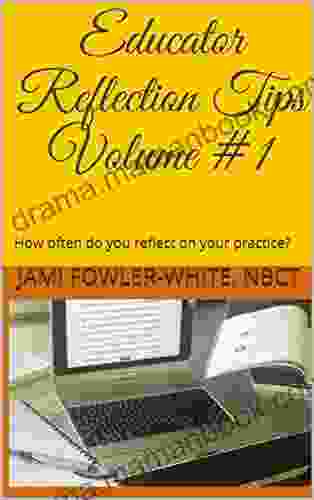Educator Reflection Tips: Volume 1 - A Comprehensive Guide for Teachers

5 out of 5
| Language | : | English |
| File size | : | 3940 KB |
| Text-to-Speech | : | Enabled |
| Screen Reader | : | Supported |
| Enhanced typesetting | : | Enabled |
| Word Wise | : | Enabled |
| Print length | : | 122 pages |
| Lending | : | Enabled |
As educators, we have the privilege and responsibility to guide and inspire young minds. To be effective in this role, it is imperative that we engage in continuous professional growth and self-reflection. Reflection allows us to examine our teaching practices, identify areas for improvement, and enhance our skills to create a more engaging and impactful learning environment for our students.
This comprehensive guide provides a roadmap for effective educator reflection, offering practical tips, strategies, and tools to help teachers foster a reflective mindset and cultivate their professional growth. By implementing these strategies, educators can become more aware of their strengths and areas for development, leading to improved teaching practices and enhanced student outcomes.
Understanding Educator Reflection
What is Educator Reflection?
Educator reflection is a systematic process of examining and evaluating one's teaching practices with the intention of improving student learning. It involves critically analyzing lessons, assessing instructional strategies, and reflecting on interactions with students to identify areas for growth and improvement.
Benefits of Educator Reflection
- Improved teaching practices: Reflection helps teachers identify areas where they can improve their teaching methods and strategies, leading to more effective and engaging lessons.
- Enhanced student learning: By reflecting on student feedback and progress, teachers can tailor their instruction to meet the specific needs of their students, resulting in improved learning outcomes.
- Professional growth: Reflection provides a framework for teachers to continuously evaluate and enhance their skills, knowledge, and pedagogical approaches.
- Increased job satisfaction: When teachers feel confident and competent in their teaching abilities, it leads to increased job satisfaction and a sense of accomplishment.
- Lifelong learning: Reflection fosters a mindset of continuous learning and improvement, encouraging teachers to stay abreast of best practices and innovative teaching methodologies.
Strategies for Effective Educator Reflection
1. Establish a Dedicated Time for Reflection
To make reflection a regular part of your professional practice, schedule a specific time each week or month to dedicate to this activity. Set aside uninterrupted time to focus on reflecting on your teaching, without distractions or interruptions.
2. Use a Reflective Journal
Maintain a reflective journal to record your thoughts, observations, and insights about your teaching practices. Regularly write down your reflections, including specific examples and evidence to support your observations.
3. Seek Feedback from Colleagues and Students
Invite constructive feedback from colleagues and students to gain different perspectives on your teaching. Ask for specific examples and suggestions for improvement. Be open to feedback and use it as an opportunity for growth.
4. Experiment with Different Teaching Strategies
Continuously experiment with different teaching strategies and activities to find what works best for you and your students. Reflect on the effectiveness of each strategy, identify what went well and what could be improved.
5. Use Data to Inform Your Reflection
Analyze student data, such as assessment results, assignments, and surveys, to identify trends and areas where students may need additional support or enrichment. Use this data to inform your reflection and identify areas for improvement.
Tools for Educator Reflection
1. SMART Goals
Develop SMART (Specific, Measurable, Achievable, Relevant, Time-bound) goals for your reflection. These goals will provide a clear focus and direction for your reflection efforts.
2. Reflective Prompts
Use reflective prompts to guide your reflection process. These prompts can help you focus on specific aspects of your teaching, such as lesson planning, classroom management, or student engagement.
3. Peer Observation
Engage in peer observations with colleagues to observe different teaching practices and gain feedback from a different perspective. This can provide valuable insights and ideas for your own reflection.
4. Reflective Rubrics
Create a reflective rubric to assess the quality of your own reflections. This rubric can include criteria such as depth of analysis, evidence-based observations, and specific recommendations for improvement.
Examples of Educator Reflection
Example 1: Lesson Reflection
Topic: Science lesson on the solar system
Reflection: "During the lesson, I noticed that students struggled to understand the concept of revolution and rotation. I realized that my explanation was not clear enough. For future lessons, I will incorporate more visual aids and provide more hands-on activities to help students grasp the concepts better."
Example 2: Student Feedback Reflection
Topic: Student feedback on a writing assignment
Reflection: "I received feedback from students that they found the writing assignment to be too vague. I realized that I had not provided clear instructions and did not give students sufficient support. For future assignments, I will provide more detailed instructions and scaffolding to help students succeed."
Example 3: Data-Informed Reflection
Topic: Data analysis of student assessment results
Reflection: "Student assessment results revealed that students performed well in the area of reading comprehension but struggled with math problem-solving. I need to allocate more time and resources to supporting students with math problem-solving skills."
Incorporating Educator Reflection into Your Practice
To effectively incorporate educator reflection into your practice, consider the following tips:
- Make it a regular habit: Schedule regular time for reflection and stick to it as much as possible.
- Be honest and open: Engage in honest self-reflection and be willing to identify areas where you can improve.
- Seek support: Collaborate with colleagues, mentors, or professional development programs to gain feedback and support your reflection efforts.
- Use reflection to drive change: Use your reflections to identify specific actions and strategies to improve your teaching practices.
- Celebrate your growth: Acknowledge and celebrate your progress in becoming a more reflective and effective educator.
Educator reflection is a powerful tool for professional growth and enhanced student learning. By engaging in systematic and intentional reflection, teachers can critically analyze their teaching practices, identify areas for improvement, and implement strategies to enhance their effectiveness in the classroom. This comprehensive guide has provided practical tips, strategies, tools, and examples to support educators in developing a reflective mindset and cultivating their professional growth. By embracing the principles of educator reflection, teachers can foster a lifelong love of learning, continuously improve their teaching practices, and empower students to reach their full potential.
5 out of 5
| Language | : | English |
| File size | : | 3940 KB |
| Text-to-Speech | : | Enabled |
| Screen Reader | : | Supported |
| Enhanced typesetting | : | Enabled |
| Word Wise | : | Enabled |
| Print length | : | 122 pages |
| Lending | : | Enabled |
Do you want to contribute by writing guest posts on this blog?
Please contact us and send us a resume of previous articles that you have written.
 Top Book
Top Book Novel
Novel Fiction
Fiction Nonfiction
Nonfiction Literature
Literature Paperback
Paperback Hardcover
Hardcover E-book
E-book Audiobook
Audiobook Bestseller
Bestseller Classic
Classic Mystery
Mystery Thriller
Thriller Romance
Romance Fantasy
Fantasy Science Fiction
Science Fiction Biography
Biography Memoir
Memoir Autobiography
Autobiography Poetry
Poetry Drama
Drama Historical Fiction
Historical Fiction Self-help
Self-help Young Adult
Young Adult Childrens Books
Childrens Books Graphic Novel
Graphic Novel Anthology
Anthology Series
Series Encyclopedia
Encyclopedia Reference
Reference Guidebook
Guidebook Textbook
Textbook Workbook
Workbook Journal
Journal Diary
Diary Manuscript
Manuscript Folio
Folio Pulp Fiction
Pulp Fiction Short Stories
Short Stories Fairy Tales
Fairy Tales Fables
Fables Mythology
Mythology Philosophy
Philosophy Religion
Religion Spirituality
Spirituality Essays
Essays Critique
Critique Commentary
Commentary Glossary
Glossary Bibliography
Bibliography Index
Index Table of Contents
Table of Contents Preface
Preface Introduction
Introduction Foreword
Foreword Afterword
Afterword Appendices
Appendices Annotations
Annotations Footnotes
Footnotes Epilogue
Epilogue Prologue
Prologue Thorsten Zeller
Thorsten Zeller Bradford Morrow
Bradford Morrow Craig Mcanuff
Craig Mcanuff John Kenney
John Kenney Sam Sykes
Sam Sykes Jack Mullen
Jack Mullen Colin Sinclair
Colin Sinclair Richard Moskowitz
Richard Moskowitz John Dewey
John Dewey Cheri Fraker
Cheri Fraker Arda Collins
Arda Collins Laurent Bernut
Laurent Bernut Matthew Sweeney
Matthew Sweeney Tom Murry
Tom Murry M A Comley
M A Comley Barry Leskin
Barry Leskin Ryan Engel
Ryan Engel Ralph Peters
Ralph Peters Roshanta Lock
Roshanta Lock Eliza Raine
Eliza Raine
Light bulbAdvertise smarter! Our strategic ad space ensures maximum exposure. Reserve your spot today!

 Brayden ReedMusic and Conflict: Salwa El Shawan Castelo Branco's Journey of Resilience...
Brayden ReedMusic and Conflict: Salwa El Shawan Castelo Branco's Journey of Resilience... Jedidiah HayesFollow ·19.7k
Jedidiah HayesFollow ·19.7k Edward BellFollow ·8.4k
Edward BellFollow ·8.4k Jason ReedFollow ·9.5k
Jason ReedFollow ·9.5k Howard BlairFollow ·8.7k
Howard BlairFollow ·8.7k Roy BellFollow ·15.2k
Roy BellFollow ·15.2k Nikolai GogolFollow ·9.6k
Nikolai GogolFollow ·9.6k Jayson PowellFollow ·13.1k
Jayson PowellFollow ·13.1k Eddie BellFollow ·6.1k
Eddie BellFollow ·6.1k

 Jesus Mitchell
Jesus MitchellThe Diabetics Menu: Your Low Carb Options
If you're living with diabetes, you may be...

 Danny Simmons
Danny SimmonsThe Sam Reilly Collection: A Treasure Trove of...
In the realm of...

 Vic Parker
Vic ParkerThe Shepherdess of Siena: The Extraordinary Life of Saint...
Catherine of Siena, known as the...

 Christian Carter
Christian CarterDive into the Mystical World of Meraki Syren: A Literary...
A Literary Odyssey Through the Depths...

 Eric Hayes
Eric HayesSimplest Method on How to Remove Credit Cards from Your...
Do you have multiple credit cards...
5 out of 5
| Language | : | English |
| File size | : | 3940 KB |
| Text-to-Speech | : | Enabled |
| Screen Reader | : | Supported |
| Enhanced typesetting | : | Enabled |
| Word Wise | : | Enabled |
| Print length | : | 122 pages |
| Lending | : | Enabled |












